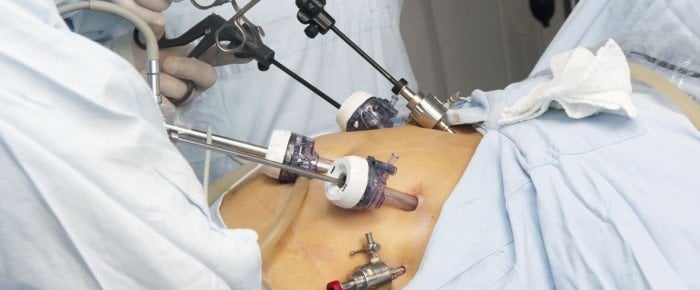The Pros and Cons of Medical Weight Loss Procedures

Gastric Bypass Surgery
First developed during the 1960s, this surgery essentially splits the stomach in two. The first stomach collects food and is connected to a lower part of the small intestine. The second stomach’s only function is to create digestive fluids to pass on to the small intestine to help digest the food. By creating a smaller stomach, the person feels fuller faster, and since some of the digestive system is skipped, a smaller amount of calories is absorbed from the food.
Pros
This type of bariatric surgery usually leads to the fastest, most dramatic results. In 6 months, as much as 50% of total weight loss takes place and can continue for as much as two years. With this rapid weight loss comes rapid recovery from a variety of weight-related afflictions, such as high blood pressure, sleep apnea, and even diabetes. Further, the results tend to last.

Learn More About Pritikin
Cons
Since the food goes through the digestive tract relatively quickly, one runs the risk of not absorbing enough nutrients. Yes, there are fewer calories absorbed by the body, but this also means that less calcium, iron, and certain vitamins from the food is absorbed. People who undergo weight loss surgery must take supplements every day to make up for these missed nutrients, and take special care to take in enough calories to be able to exercise safely.
Further, gastric bypass is a major surgery, and as such it carries significant risks, such as blood clots and infections. In some cases, more of the small and even large intestine need to be removed. Gallstones also tend to occur.
- Further Gastric Bypass Information
- Bariatric Surgery Videos
- Dietary Guidelines after Bariatric Surgery
- Gastric Bypass and Alcohol
- Long-Term Mortality after Gastric Bypass Surgery
- Bariatric Surgery: Diet
- Bariatric Surgery Resource
Gastric Banding
The gastric band is an inflatable band surgically placed around the stomach that can ostensibly create a smaller upper stomach and a larger lower one. With this smaller upper stomach slowly passing food through the small channel to the lower stomach, people feel full faster, causing them to eat less.
Pros
Unlike gastric bypass, nothing about this surgery is permanent. If you decide to have the band removed, it is a relatively simple surgery. Also, compared to gastric bypass surgery, gastric banding surgery is safer and can be recovered from faster. There is also some degree of customization with a gastric band. The band can be tightened or loosened with the injection or removal of saline from the band by a doctor.
Cons
Compared to gastric bypass surgery, weight loss with a gastric band tends to take more time. This can mean that the weight-related afflictions can remain longer after surgery. There are also fairly significant risks that are unique to this surgery. The band may slip or leak, which can cause extreme pain with the only relief coming from further surgery.
- Further Gastric Banding Information
- How Gastric Banding Works: Video
- Gastric Band Complications
- Gastric Banding: Monitoring Nutrition
- Dietary Guidelines
- Laparoscopic Gastric Band
- More About Gastric Banding Surgery
Gastric Sleeve
A gastric sleeve, or sleeve gastrectomy, is another form of bariatric surgery. This surgery removes approximately three quarters of the stomach, and what remains resembles a sleeve which connects the esophagus to the small intestine.
Pros
This type of bariatric surgery is perfect for patients who may be at higher risk for complications during surgery. Unlike gastric banding, there is no foreign restrictive device left in the body to cause potential complications, slip, or cause infection. Also, a sleeve gastrectomy causes the patient to lose weight faster than that lost following the gastric band, though the gastric sleeve is not as fast as gastric bypass surgery. Typically, 30-50% of weight loss occurs in the first six months to a year and can continue for up to two years. Finally, this surgery can be followed up with gastric bypass. For the extremely obese, gastric bypass can be a dangerous surgery. Losing weight with a sleeve gastrectomy can open the door to gastric bypass for these patients.
Cons
First and foremost, unlike gastric banding, a gastric sleeve is irreversible. Part of the stomach is completely removed, and as such this surgery cannot be undone. The stomach is stapled where it is cut, and these staples can leak, causing a variety of health problems, including infection. While the surgery is not reversible, this does not mean weight gain is impossible. The nature of the stomach is that can stretch, and this does not change post-surgery. With poor dietary decisions, one can stretch the stomach back to its original size.
- Gastric Sleeve Video
- Gastric Sleeve vs. Lap Band Surgery
- Gastric Sleeve Diet
- Weight-Loss Surgery for Adults with Diabetes or Prediabetes
- Sleeve Gastrectomy or Gastric Sleeve
- Gastric Sleeve: Risks and Benefits
- Gastric Sleeve Surgery
Natural Alternatives To Weight Loss Procedures
Weight loss surgeries like bypass surgery should be a last resort after all other options have been tried, and there are excellent options.
“In my 30 years at the Pritikin Longevity Center, I’ve seen hundreds of men and women lose 50 to 100 pounds and more just by exercising and following the Pritikin Eating Plan,” observes Dr. Jay Kenney, PhD, RD, Educator and Nutrition Research Specialist at the Pritikin Longevity Center in Miami.
Pritikin is a program of healthy eating, exercise, and lifestyle change that differentiates itself from other weight-loss resorts by its scientific efficacy. More than 100 studies have been published in peer-reviewed medical journals documenting the Pritikin Program’s success in helping thousands worldwide shed excess weight, control diabetes, reduce high blood pressure to the point where drugs are no longer needed, and markedly lower other cardiovascular risk factors like the metabolic syndrome, cholesterol, and triglycerides.
Post-Surgery Hurdles
“It’s also important to keep in mind that life after weight loss surgery is no easy ride,” points out Dr. Danine Fruge, MD, Associate Medical Director at Pritikin.
“Post surgery, physicians routinely advise that patients make a complete change in lifestyle.”
Foods to be avoided include sugary foods, red meat, high-fat foods, high-fiber foods, and milk. Too much fat can cause reflux, a back-up of stomach acid and food into the esophagus that causes heartburn. Common offenders are fried foods and fatty meats.
And because the new stomach can only hold about one-half cup of food at a time, patients are advised to sit down to three to six very small meals every day, eat very slowly, and chew thoroughly. Overeating may cause vomiting, expansion of the stomach pouch, weight gain, or even rupture of the stomach.
Major Lifestyle Change
Observes Dr. Fruge: “You can undergo gastric bypass surgery, and then make major lifestyle changes. Or you can avoid surgery altogether – and all its risks and downsides – and make the same lifestyle changes that surgery would have forced you to make by following a safe, natural, science-based approach like the Pritikin Program.
“With Pritikin, the only side effect is better health – better blood pressure, better cholesterol, better diabetes control, freedom from angina pain and heart surgeries, and last but not least, healthy long-term weight control. It’s all good news – and no horror stories.”

Get All the Details of a Stay at the Pritikin Center in Your Inbox
Wellness Resort
Weight Loss Retreat
Health Spa